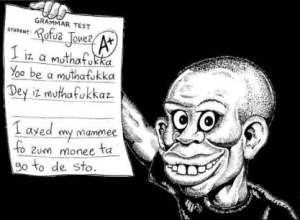Until recently, I overlooked the term Ebonics. Misinformed, I thought the term was used to define a type of slang used predominantly by African Americans in the English language. Now that I have done some research on Ebonics, or the African American English (AAE); I have a few thoughts I would like to share. In my opinion, Ebonics is a type of speech predominately used by American Americans. Ebonics is not a language, it is a dialect. It is way of speaking that involves heavy use of slang and punctuation differences. For example, ‘past’ (pas’) and ‘hand’ (han’) (Rickford). In my personal experience as an African American, Ebonics is spoken only in urban settings among family and peers. When speaking in professional settings, African Americans are able to speak with ‘Standard American English.’ Prior to researching this issue that is Ebonics, I was unaware of the group of African Americans, primarily of the lower class, who do not know how to make the adjustment from AAE to ‘Standard American English’. Therefore, originally I immediately took offense to the term Ebonics and everything I thought it stood for.
Conversely, Ebonics is a play on the use of the words ebony and phonics, in regard to black dialogue in connection with the English phonetic system. The term was created in 1973 by a group of black scholars who wanted to address the negative overtone of terms like ‘Nonstandard Negro English’ or ‘Black English.’ Ebonics remained unrecognized by linguist and the public; that is, until the Oakland California School Board began to identify Ebonics as the ‘primary’ language of the majority African American students in their schools. As a result, the Oakland board resolved to reference Ebonics when teaching students of the identified demographic standard or academic English (Rickford).

This photo illustrates the misconception of the school board’s resolution to reference Ebonics in school.
This resolution sparked controversy due to its declaration of AAE to be the ‘genetically-based’ language of its African American students, not a dialect of English. The Oakland board initially called AAE a separate language derived from African linguistic roots, with heavy borrowings from English vocabulary. This would suggest that somehow African Americans took their African language and transformed it into some kind of scrambled language that has similarities to English, however it is not English. Immediate criticism emerged, leading the Oakland board to issue a clarification of their resolution in order to end the misconceptions displayed in press stories (Edwards 176).
“Many factors contributed to the negative reaction towards efforts of the Oakland resolution. These include TV images representing Ebonics as the equivalent of Black slang, the positioning of Black children speaking this variety in school (which is perceived by African Americans as a formal environment), and the media’s framing and coding of the case in a way that was antithetical to the notion that language use is contextual. For many African Americans, this resolution stood in opposition to their historic stance of wanting their children to gain oral and written competence in the formal and informal varieties of Black English and ‘white’ Standard English. And thus the Oakland resolution, contrary to its enormous possibilities, threatened to be another instance of the narrowing of options for African American children” (Perry and Delpit 10-11).
The Oakland board denied the rumors to teach Ebonics in the place of English, to classify AAE speaking students as bilingual, or to encourage the use of slang. In efforts to defuse the backlash of the initial statement’s usage, “genetic-based”, it was restated that the term “genetically based” is synonymous with genesis. In the clause, “African language systems are genetically based and not a dialect of English”, the term “genetically based” is used according to the standard dictionary of “has origins in” (Edwards, 172).
Overall, the Oakland board’s intent was to suggest that AAE is an independent system, with a genesis unrelated to English. Further changes were made to the resolution, which now reads: “…demonstrated that the African language systems have origins in West and Niger-Congo languages and are not merely dialects of English.” Other sections were also amended by the Oakland board to clarify its intent to build upon existing language skills in order to move students from the language patterns they bring to school to English proficiency (Edwards 176). The board recognized the non-standard student’s lack of the ability to register, a situational variation that occurs when a person talks one way to parents, another way to an employer, and still another way to a stranger encountered in a grocery store (Blair, Calderonello and Martin 7).
The following is a clip from the documentary “Do you speak American,” which demonstrates how many California schools use their knowledge of the structure of AAE, in the classroom to speak and use the standard American English dialect.
All in all, the Oakland board’s sole purpose was to acknowledge AAE as a dialect that exists in the black community. The Oakland board sought out to dismiss the misconceptions of both black and white people, who speakers of AAE to be limited in education or sophistication. It is important to note that all language variations reflect in many ways the cultures of people who speak them. “Although every human being is born into a language community, no one learns to speak ‘just’ a particular language, such as English, French, Chinese, or Arabic. Instead, each human acquires facility with a particular variety of his or her language, called a dialect. Dialects feature changes from the basic language in terms of vocabulary, pronunciation, or grammar that follow a pattern. Moreover, because the language variety associated with educated, middle class speakers is considered ‘standard’ or normative, grammatical forms, pronunciations, and language variants associated with other dialects are often regarded as bad or substandard” (Blair, Calderonello and Martin 6-7).
On the subject of public views in regard to AAE, I would like to direct your attention to the testimony of Rachael Jeantel, a witness for the high-profile trial against George Zimmerman. During her testimony Jeantel speaks in AAE, as well as Haitian Creole and Spanish. The public responded negatively to Jeantel’s speech and sparking heated debate. Jeantel was compared to “a junkie,” an “animal,” and “the missing link between monkeys and humans.” One commentator stated that “You could swap her out for a three-toed sloth and get the same witness value and response.” Another commentator stated that: “She has to be the most, ignorant, ghetto, uneducated, lazy, fat, gross, arrogant, stupid, confrontation Black bitch I’ve ever seen in my fucking life. Yes, I said it . . . and I’m Black.”

An Instagram photo that was posted by Molly West, the adult daughter of Don West, George Zimmerman’s defense lawyer.
Many have suggested that Jeantel’s language is not correct and that she should instead speak ‘standard’ English. Such ideas about the perceived ‘correctness’ or ‘incorrectness’ of her language are misguided in that they mistakenly assume there is one Logical form of a language. Ultimately, Jeantel’s use of AAE is an important aspect of her ability to communicate and identify with other African Americans.
The following is a photo posted on photo-sharing site Instagram from the account “mollywestttt” showing a picture of
veteran criminal defense attorney Don West and his daughters eating generously-sized ice cream cones. The photo’s caption reads: “we beat stupidity celebration cones,” along with “#Zimmerman,” “#defense” and “#dadkilledit” (Kuo).
To get further understanding, please take a moment to watch the following video of Chris Hayes and an linguistics expert, John McWhorter, breaking down Rachel Jeantel’s ‘articulate’ use off Black English.
To conclude, the anti-Ebonics ideology that is described here illustrates the public perception of what is intelligent and “proper English.” The Oakland resolution brought about discussions of language ideology. The resolution, moreover, initiated a national discourse on language in which attitudes towards Ebonics served as a safe proxy for a discourse on the threats that racialized groups pose to dominant group power in the United States (Karn and Ronkin 173-174). When discussing language and dialect who must be aware that no dialect is better or worse than any other; no dialects are “broken.” Language use does not exist free of dialect. All dialects serve the needs of their speakers by allowing meaningful communication and follow a clear system of rules; those who know the rules fit in, and those who don’t, don’t (Bir 7-8).
